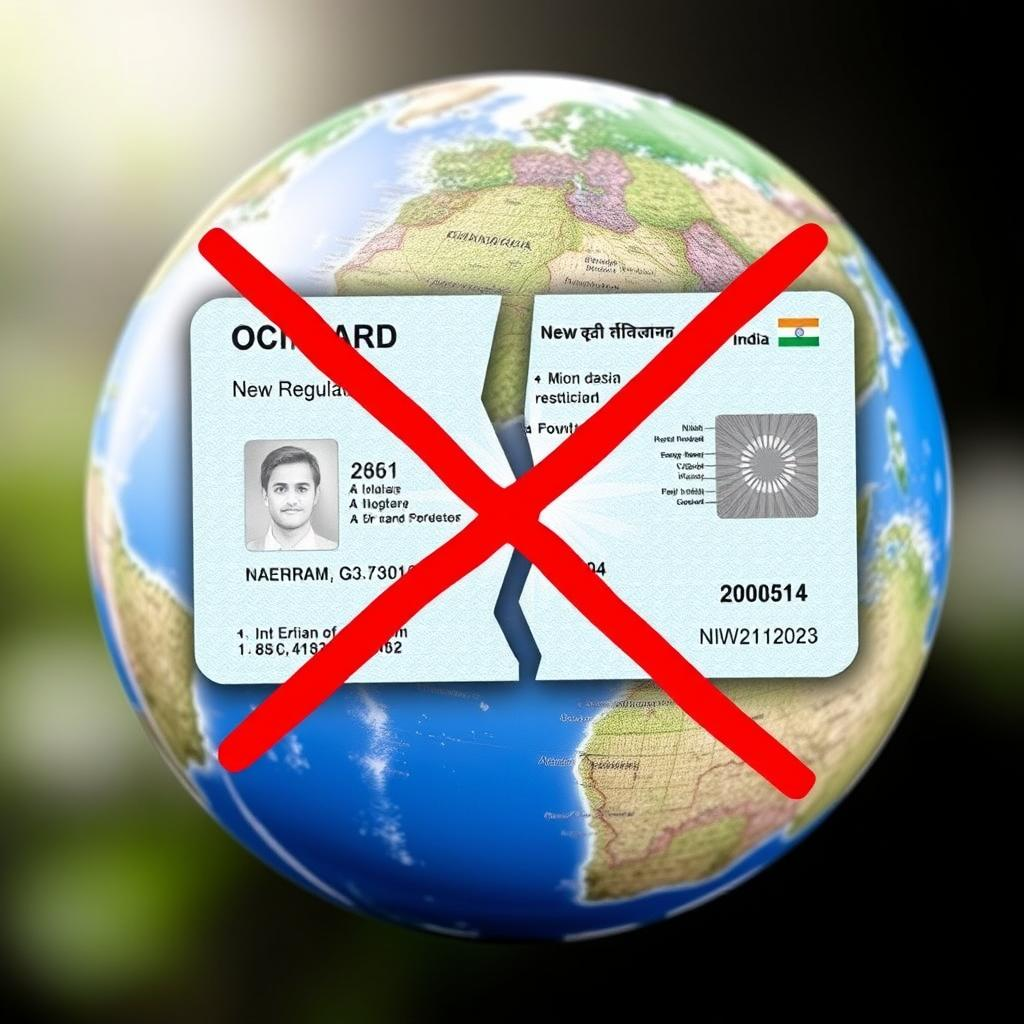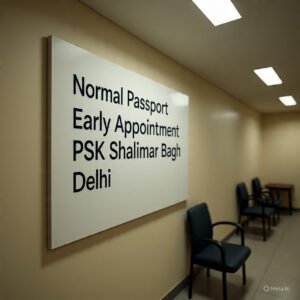A new era of scrutiny has dawned for individuals of Indian origin holding the Overseas Citizen of India (OCI) card.2 The Government of India, through its Ministry of Home Affairs (MHA), has recently announced a significant tightening of the rules governing this prestigious status.3 This move signals a clear intent to protect national security and maintain the integrity of the OCI scheme, ensuring that the privilege of visa-free travel and other benefits is not extended to those with serious criminal backgrounds.4
The Overseas Citizen of India program, which began in 2005, has long served as a bridge connecting the vast Indian diaspora to their homeland.5 It grants individuals of Indian origin a lifelong, multi-purpose visa and other special privileges, effectively creating a powerful link without granting them full Indian citizenship.6 However, recent amendments to the Citizenship Act, 1955 have introduced a stricter framework, empowering the government to cancel an OCI card based on an individual’s criminal record.
Table of Contents
Understanding the New OCI Card Rules
The most recent OCI Card Rules are a direct result of an official gazette notification issued by the Ministry of Home Affairs.8 This notification introduces two critical grounds for the cancellation of an Overseas Citizen of India registration, which now apply to all existing cardholders, regardless of where the crime was committed.9
The Two Major Triggers for Cancellation
The new regulations specify that an Overseas Citizen of India registration is liable for cancellation if the cardholder falls into either of the following two categories:
- Conviction with a Jail Sentence: If an OCI cardholder is sentenced to imprisonment for a term of not less than two years.10 This provision is designed to target individuals with a proven record of serious criminal offenses, whether in India or abroad.11
- Being Charge-sheeted for Serious Crimes: An individual’s registration is also at risk if they are named in a charge sheet for an offense punishable with imprisonment for a term of seven years or more.12 This is a particularly noteworthy addition as it allows for action to be taken even before a conviction, based on the gravity of the alleged crime.
These new grounds for cancellation demonstrate a significant shift in policy.13 Previously, the cancellation of an OCI card based on criminal conviction was only possible within the first five years of registration and required a minimum jail term of two years.14 The latest amendments remove this five-year time limit, making the cardholder’s status perpetually conditional on their legal conduct.15 This change ensures that the government can act on serious offenses at any point during the cardholder’s lifetime.16
The Legal and Policy Context
The amendments are an exercise of the powers conferred by clause (da) of Section 7D of the Citizenship Act, 1955.17 This legal foundation provides a robust mechanism for the central government to enforce these new OCI Card Rules. The move is aimed at tightening the legal framework surrounding OCI status, which is considered a privilege, not a fundamental right.18
The MHA has emphasized that the provision applies irrespective of whether the conviction or charge sheet occurred in India or abroad.19 The key condition is that the offense must be recognized under Indian law.20 This global applicability is a crucial aspect of the new policy, ensuring that individuals who commit serious crimes in their country of residence cannot use their Overseas Citizen of India status as a means to evade justice or gain unrestricted access to India.
Why the Change?
The recent modifications have been prompted by a desire to strengthen the integrity of the OCI scheme. Over the years, there have been instances where cardholders have been found to be involved in criminal or anti-national activities.21 The government’s stance is that the benefits of the OCI card should be reserved for individuals who uphold legal and ethical standards.22 This is seen as a deterrent against the misuse of the scheme and a way to protect the country’s interests.23
- Protecting National Security: By revoking the status of individuals with serious criminal backgrounds, the government aims to prevent potential threats to national security.24
- Maintaining Public Order: The new rules contribute to maintaining public order by ensuring that individuals involved in grave crimes do not have easy access to India.
- Deterrence Against Misuse: The updated regulations serve as a clear warning to NRI and other foreign nationals of Indian origin that the OCI card is a revocable privilege, not an unconditional entitlement.25
Impact on OCI Cardholders and the Indian Diaspora
The new OCI Card Rules have significant implications for the millions of people of Indian origin living abroad. While the vast majority of OCI cardholders are law-abiding citizens, the changes introduce a layer of uncertainty for those who may have had past legal issues or are currently facing criminal charges.
For a person with an OCI card, the prospect of having their status revoked can be deeply unsettling. The card offers a lifeline to their ancestral land, providing a lifelong visa and the freedom to travel, work, and own non-agricultural property in India.26 Its cancellation would strip them of these rights, forcing them to apply for a standard visa like any other foreign national, a process that can be both lengthy and restrictive.
Other Important Considerations
It is important to note that the new rules are part of a broader trend of regulatory changes concerning the OCI scheme.27 In recent years, the government has also introduced other modifications, such as the requirement for special permits for certain activities like journalistic work, mountaineering, or missionary activities.28 These changes collectively suggest a more stringent approach to managing the rights and responsibilities of Overseas Citizen of India cardholders.29
Furthermore, these regulations are distinct from other immigration processes, such as the U.S. green card system or the Visa Bulletin, and pertain specifically to the privileges granted by the Indian government. The new OCI Card Rules underscore the principle that while the Indian diaspora is valued, their special status is a conditional one, subject to the laws and security concerns of the country.
Frequently Asked Questions (FAQ)
Q1: What is an Overseas Citizen of India (OCI) card?
An Overseas Citizen of India (OCI) card is an immigration status that allows foreign nationals of Indian origin a lifelong, multiple-entry, multi-purpose visa to visit India.30 It is not equivalent to Indian citizenship, but it provides many benefits, including exemption from reporting to the police for any length of stay in India and the right to own non-agricultural property.31
Q2: Who is eligible for an OCI card?
A foreign national, who was a citizen of India on or after January 26, 1950, or was eligible to become a citizen of India on that date, or who belongs to a territory that became part of India after August 15, 1947, is eligible. The spouse and children of such individuals can also apply. Nationals of Pakistan and Bangladesh are explicitly excluded from the scheme. The official website of the Ministry of Home Affairs provides detailed eligibility criteria.
Q3: What are the new grounds for OCI card cancellation?
As per the recent gazette notification, an OCI card can be canceled if the holder is sentenced to imprisonment for a term of two years or more, or if they are named in a charge sheet for an offense punishable by seven years or more.32
Q4: Do these new rules apply to existing OCI cardholders?
Yes, the new regulations are not limited to new applicants.33 The MHA notification specifies that an Overseas Citizen of India registration “shall be liable to get cancelled” under the new conditions, applying to all registered cardholders.34
Q5: Can I get my OCI card back if it is cancelled?
The process for reinstatement of an OCI card after cancellation is not straightforward and would likely involve a legal challenge. The decision to cancel is made by the central government, and any appeal would be subject to a thorough review, with no guarantee of a favorable outcome.35
Conclusion
The new OCI Card Rules represent a significant policy shift by the Government of India.36 By introducing stricter criteria for the cancellation of Overseas Citizen of India status based on criminal records, the Ministry of Home Affairs has sent a clear message: the OCI card is a privilege, not an unconditional right.37 This move is aimed at strengthening national security and ensuring that the scheme’s benefits are not extended to those who have engaged in serious criminal activity.38 For the global Indian diaspora, this reinforces the importance of legal and ethical conduct, as the connection to their homeland is now more than ever conditional on a clean legal record.
Disclaimer
This article is for informational purposes only and does not constitute legal advice. The information provided is based on public sources and interpretations of recent government notifications. For specific legal guidance regarding OCI status or any other immigration matter, readers should consult with a qualified legal professional or refer to the official government websites, such as the Ministry of Home Affairs.
Affiliate Disclosure
This article may contain affiliate links to products or services that we believe may be useful to our readers. We may earn a commission if you make a purchase through these links, but this does not influence our editorial content or the integrity of our information. We only recommend products and services that we genuinely believe in and that are relevant to our audience.







